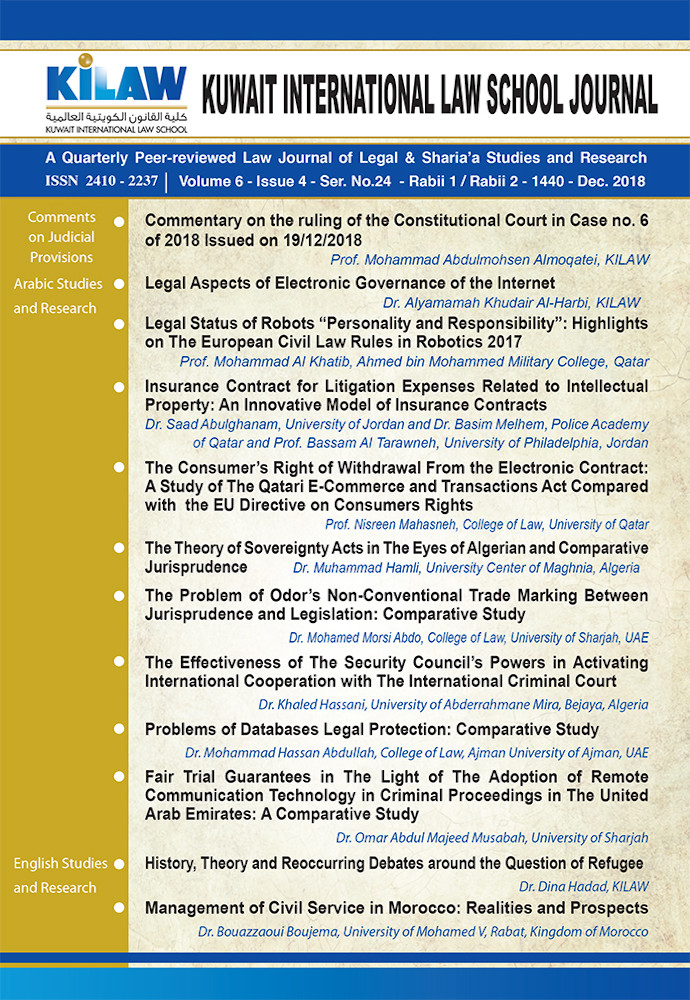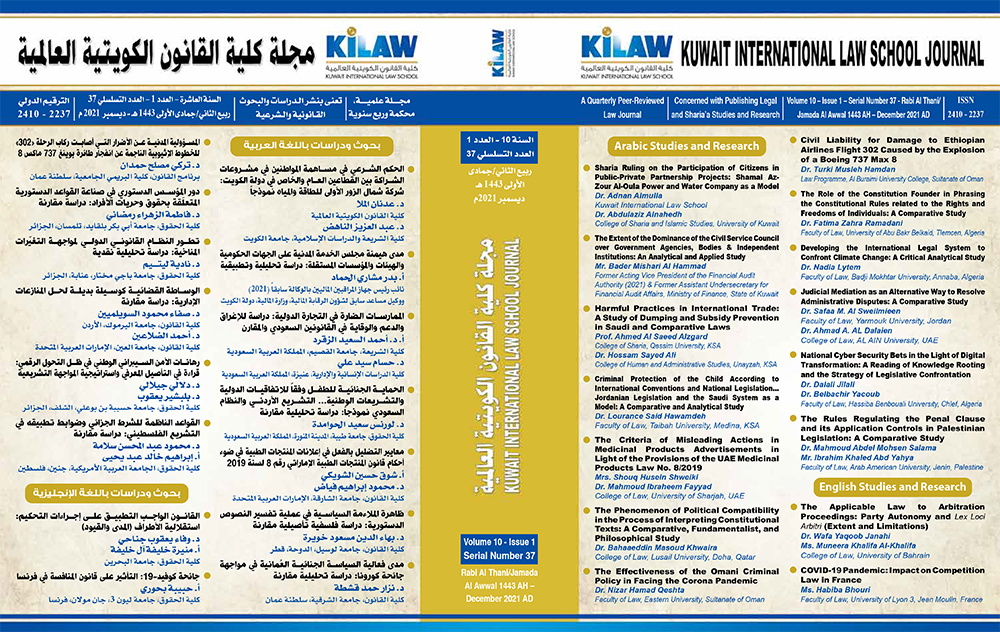| Volume 6 | Rabii 1/ Rabii 2 1440 |
| Issue 4 | December 2018 |
| ISSN 24102237 |

Editorial
Activating the Legal and Regulatory Framework to Combat Corruption
By: Prof. Badria A. Al-Awadi
Editor-in-Chief
The spread of financial and administrative corruption is considered one of the main obstacles hindering the development of countries and deterring the revival and progress of nations. Therefore, constitutions, local laws, charters, and international declarations have tended to set clear and strict provisions aimed to combat this imminent and continuing danger, reinforced by a detailed operational roadmap, as is the case in the United Nations Convention Against Corruption (CAC) adopted by the UN General Assembly on October 31, 2003, which was the outcome of an international legal effort that lasted for several years and resulted in the development of efficient and effective international legal and technical standards. This agreement covers five main areas: preventive measures, criminalization and law enforcement, international cooperation, asset recovery, technical assistance, and information exchange. It also addressed many different forms of corruption, such as bribery, abuse of influence, abuse of authority, and various acts of corruption in the private sector.
Activating the Legal and Regulatory Framework to Combat Corruption
Chief-in-Editor Prof. Badria A. Al-Awadi
The spread of financial and administrative corruption is considered one of the main obstacles hindering the development of countries and deterring the revival and progress of nations. Therefore, constitutions, local laws, charters, and international declarations have tended to set clear and strict provisions aimed to combat this imminent and continuing danger, reinforced by a detailed operational roadmap, as is the case in the United Nations Convention Against Corruption (CAC) adopted by the UN General Assembly on October 31, 2003, which was the outcome of an international legal effort that lasted for several years and resulted in the development of efficient and effective international legal and technical standards. This agreement covers five main areas: preventive measures, criminalization and law enforcement, international cooperation, asset recovery, technical assistance, and information exchange. It also addressed many different forms of corruption, such as bribery, abuse of influence, abuse of authority, and various acts of corruption in the private sector.
In light of historical and cumulative efforts in which local civil society organizations and constitutional institutions represented by Kuwait’s National Assembly and Audit Bureau, the State of Kuwait acceded to CAC under Law No. 47 of 2006, and accordingly established Kuwait Anticorruption Authority (Nazaha) by issuing Law No. 2 of 2016, which entrusted this Authority with several tasks and responsibilities, the most important of which are: “reinforcing the principle of transparency and integrity in economic and administrative transactions to ensure the rational management of state funds, resources and property, and the optimal use of them… and working to combat corruption, to ward off its risks and effects, to prosecute its perpetrators, to seize and recover funds and proceeds resulting from its practice in accordance with the law… and to protect state agencies from bribery, trading in influence and misuse of power to achieve private benefits and prevent mediation and nepotism”.
The law also entrusted the Authority with “developing a comprehensive national strategy for integrity, transparency and anti-corruption; preparing mechanisms, plans and programmes; implementing them, and following up their implementation with the concerned authorities,” in addition to other tasks, which comprise a serious and complex issue that requires the mobilization of various resources, through cooperation with government administrative agencies and civil society organizations that had been working in the same field for several years. These tasks also require the formation of an efficient, experienced, and effective administrative and executive body.
Therefore, the Authority faced many obstacles and problems for fundamental reasons, some of which are related to the law of its establishment, the extent of its independence, and the powers granted to it; and other issues related to administrative, organizational and practical reasons, which is what jurists and experts referred to when the law was issued, and the formation of the Authority was announced.
In this context, the memorandum recently addressed by the Authority to the Council of Ministers, which was published in the local press at the beginning of November 2021, raises the problems facing the Authority and the obstacles that prevent countries from achieving their goals, which requires the initiative to correct the legal and administrative situation, and effective measures by The Council of Ministers, which, according to Article (123) of the Constitution, dominates the interests of the state, draws up the general policy of the government, monitors its implementation, and supervises the workflow in government departments.
The aforementioned memorandum includes two parts of the demands from the Council of Ministers, one of which is administrative and related to directing the administrative bodies (such as the Civil Service Commission, the Real Estate Registry and Documentation Department), and the various supervisory authorities to cooperate with it, exchange data, information and results of investigations, and activate the protection of whistle blowers stipulated in the law establishing the Kuwait Anticorruption Authority (paragraph 4 of Article 5), and the second is a legislative law which relates to the need for the Council of Ministers to rush to do what is necessary with the National Assembly to issue legislation ensuring the criminalization of bribery in the private sector and bribery of a foreign public official, as well as a legislation that ensures the expansion of the scope of responsibility of legal persons in corruption crimes, in addition to a new legislation to prevent cases of conflict of interest, after the first annulment by the Constitutional Court.
If there is no doubt that these proposed measures are due to enhance the role of the authority in combating corruption, which constitutes one of the important practical social priorities of the state, yet what is required to activate the work of combating financial and administrative corruption is broader than that, and this includes reviewing the legal status of the commission towards strengthening its independence and competencies, activating its legal and executive tools, and using it with qualified and experienced national administrative and legal cadres known for their integrity and transparency. This also includes cooperation with civil society organizations that have been working in the same field for some time, and cooperation with legal academic institutions, national media, and educational institutions to increase awareness of the values of transparency and integrity in the different sectors of society.
Content
Arabic Studies and Research
Sharia Ruling on the Participation of Citizens in Public-Private Partnership Projects: Shamal Az-Zour Al-Oula Power and Water Company as a Model
Dr. Adnan Almulla
Associate Professor of Comparative
Jurisprudence and Islamic Studies
Kuwait International Law School
Dr. Abdulaziz Alnahedh
Assistant Professor of Comparative
Jurisprudence and Sharia Policies
College of Sharia and Islamic Studies
University of Kuwait
The Extent of the Dominance of the Civil Service Council over Government Agencies, Bodies & Independent Institutions: An Analytical and Applied Study
Mr. Bader Mishari Al Hammad
Former Acting Vice President of the Financial Audit Authority (2021)
& Former Assistant Undersecretary for Financial Audit Affairs
Ministry of Finance, State of Kuwait
Harmful Practices in International Trade: A Study of Dumping and Subsidy Prevention in Saudi and Comparative Laws
Prof. Ahmed Al-Saeed Alzgard
Professor of Civil Law, College of Sharia
Qassim University, KSA
Dr. Hossam Sayed Ali
Associate Professor of Commercial Law
College of Human and Administrative Studies
Unayzah, KSA
Criminal Protection of the Child According to International Conventions and National Legislation… Jordanian Legislation and the Saudi System as a Model: A Comparative Analytical Study
Dr. Lourance Said Hawamdeh
Associate Professor of Criminal Law
Faculty of Law, Taibah University
Medina, KSA
The Criteria of Misleading Actions in Medicinal Products Advertisements in Light of the Provisions of the UAE Medicinal Products Law No. 8/2019
Mrs. Shouq Husein Shweiki
PhD. researcher
College of Law, University of Sharjah, UAE
Dr. Mahmoud Ibraheem Fayyad
Associate Professor of Private Law
College of Law, University of Sharjah, UAE
The Phenomenon of Political Compatibility in the Process of Interpreting Constitutional Texts: A Comparative, Fundamentalist, and Philosophical Study
Dr. Bahaaeddin Masoud Khwaira
Assistant Professor of Constitutional Law
College of Law, Lusail University, Doha, Qatar
The Effectiveness of the Omani Criminal Policy in Facing the Corona Pandemic
Dr. Nizar Hamad Qeshta
Assistant Professor of Criminal Law
Faculty of Law, Eastern University
Sultanate of Oman
Civil Liability for Damage to Ethiopian Airlines Flight 302 Caused by the Explosion of a Boeing 737 Max 8
Dr. Turki Musleh Hamdan
Associate Professor of Commercial Law,
Law Programme, Al Buraimi University College,
Sultanate of Oman
The Role of the Constitution Founder in Phrasing the Constitutional Rules related to the Rights and Freedoms of Individuals: A Comparative Study
Dr. Fatima Zahra Ramadani
Professor Lecturer “A” of Constitutional Law
and Comparative Political Systems
Faculty of Law and Political Science
University of Abu Bakr Belkaid, Tlemcen, Algeria
Developing the International Legal System to Confront Climate Change: A Critical Analytical Study
Dr. Nadia Lytem
Professor Lecturer “A” of Public International Law
Faculty of Law and Political Science
Badji Mokhtar University, Annaba, Algeria
Judicial Mediation as an Alternative Way to Resolve Administrative Disputes: A Comparative Study
Dr. Safaa M. Al Sweilmieen
Associate Professor of Administrative Law
Faculty of Law, Yarmouk University, Jordan
Dr. Ahmad A. AL Dalaien
Associate Professor of Public Law
College of Law, AL AIN University, UAE
National Cyber Security Bets in the Light of Digital Transformation: A Reading of Knowledge Rooting and the Strategy of Legislative Confrontation
Dr. Dalali Jilali
Professor lecturer “A”
Faculty of Law and Political Science, Hassiba Benbouali University, Chlef, Algeria
Dr. Belbachir Yacoub
Professor lecturer “B”
Faculty of Law and Political Science, Hassiba Benbouali University, Chlef, Algeria
The Rules Regulating the Penal Clause and its Application Controls in Palestinian Legislation: A Comparative Study
Dr. Mahmoud Abdel Mohsen Salama
Assistant Professor of Civil Law
Private Law Dept., Faculty of Law, Arab American University, Jenin, Palestine
Mr. Ibrahim Khaled Abd Yahya
Lecturer
Private Law Dept., Faculty of Law, Arab American University, Jenin, Palestine
English Studies and Research
The Applicable Law to Arbitration Proceedings: Party Autonomy and Lex Loci Arbitri (Extent and Limitations)
Dr. Wafa Yaqoob Janahi
Assistant Professor in Civil Law
College of Law, University of Bahrain
Muneera Khalifa Al Khalifa
Research and Teaching Assistant
College of Law, University of Bahrain
COVID-19 Pandemic: Impact on Competition Law in France
Habiba Bhouri
Teacher Assistant, Kuwait International Law School
PHD student, University of Lyon 3-Jean Moulin, France

